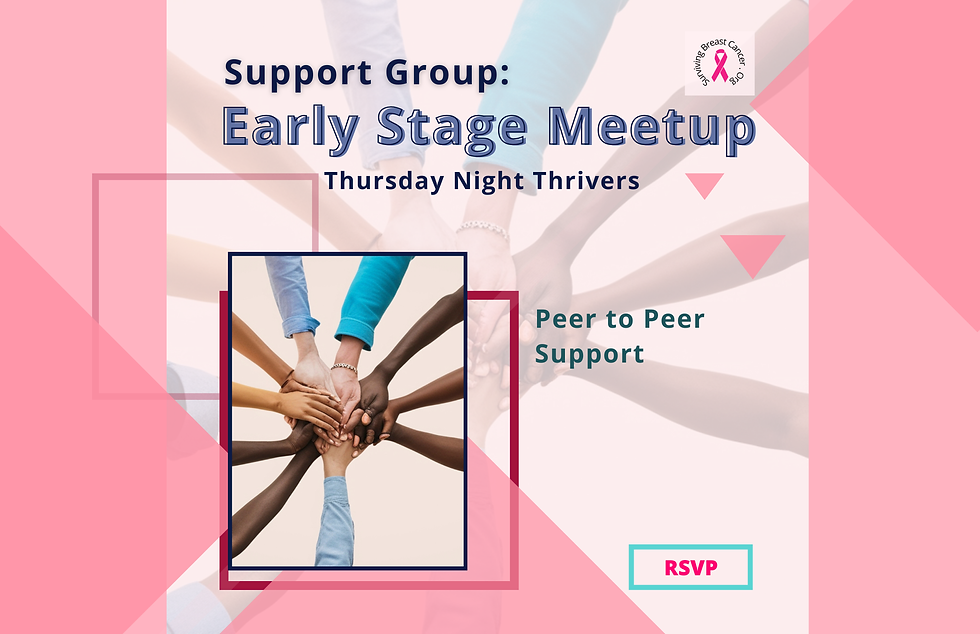The Role of Nutrition in Breast Cancer Recovery: Optimizing Your Diet for Healing
- Surviving Breast Cancer

- Jun 18, 2025
- 3 min read
Updated: Sep 23, 2025
By Dennis Mensah, BSN, RN
Cancer treatments such as chemotherapy, radiation, and surgery often lead to side effects like nausea, weakness, and appetite loss. A well-structured diet can help counteract these effects, promote healing, and strengthen your immune system. This guide explores the importance of nutrition in breast cancer recovery, the benefits of plant-based diets, essential supplements, and expert tips to enhance well-being.

Tips from Nutrition Specialists for Recovery
Cancer treatment is hard enough; what simple strategies can you apply to support your nutrition? To enhance recovery and well-being, nutrition specialists recommend the following strategies:
Focus on whole foods: Prioritize whole, nutrient-dense foods over processed options to maximize health benefits. If you receive outpatient treatment at a cancer center or hospital, consider bringing healthy snacks with you on treatment days.
Stay hydrated: Drink at least eight glasses of water daily. Herbal teas and broths can provide additional nutrients while keeping you hydrated. A personal reusable water bottle is your best friend!
Plan meals in advance, or ask loved ones to start a meal train for you: Meals prepared ahead of time will ensure you have access to nutritious options, even on low-energy days.
Seek professional guidance: A registered dietitian specializing in oncology nutrition can provide personalized meal plans and expert recommendations, including nutritional counseling tailored to your individual needs.
Managing Side Effects
Side effects like nausea and fatigue can make eating challenging. What should you do if you start to dread mealtimes during cancer treatment? Nutritionists recommend consuming small portions of nutrient-dense meals, such as smoothies, soups, and soft fruits, throughout the day. Staying hydrated is equally important, as dehydration can contribute to fatigue and impact overall well-being.
Antioxidants for Your Immune System
A strong immune system is essential for recovery. Antioxidants from fruits and vegetables that contain nutrients such as vitamins A, C, E, and D, along with minerals like zinc and selenium, help your body combat infections and promote healing. Incorporating a variety of fruits, vegetables, whole grains, and lean proteins ensures essential nutrients for immune support. Berries, leafy greens, and cruciferous vegetables like broccoli and kale are particularly beneficial.
The Importance of Protein
Your body requires ample protein to rebuild tissues and maintain muscle mass. Lean protein sources such as chicken, fish, beans, and legumes support this healing process.
The Benefits of a Plant-Based Diet
Studies suggest that a plant-based diet rich in fruits, vegetables, whole grains, nuts, and seeds may reduce cancer recurrence risk and improve overall health. Benefits include:
Fiber: A plant-based diet provides ample fiber, which supports digestive health, regulates blood sugar, and promotes a balanced gut microbiome, which is essential for a strong immune system.
Weight management: Maintaining a healthy weight is crucial, as excess weight can increase the risk of cancer recurrence. A plant-based diet is nutrient-dense yet lower in calories, making it a healthy choice for weight management.
Heart health: Breast cancer survivors, particularly those who have undergone certain treatments, may be at higher risk for heart disease. Plant-based diets help lower cholesterol and regulate blood pressure, supporting overall cardiovascular health.
What About Nutritional Supplements?
While whole foods should be your primary source of nutrition, supplements may be necessary in some cases. Consult with your oncology team before starting any supplements. Some options include:
Multivitamins: For patients with dietary restrictions or poor appetite during treatment, a daily multivitamin may help fill nutritional gaps.
Vitamin D: This vitamin plays a role in immune function and blood pressure regulation. Since many individuals have a deficiency, supplementing vitamin D under medical guidance can be beneficial.
Omega-3 fatty acids: Found in fish oil and flaxseed, omega-3 fatty acids possess anti-inflammatory properties and support heart health, which is particularly important for breast cancer survivors.
Nutrition as a Key to Recovery
Nutrition plays a vital role during and after breast cancer treatment. Adopting a plant-focused diet, incorporating essential nutrients, and following expert recommendations can help you improve your overall well-being and long-term health. Remember, every meal is an opportunity to nourish your body and promote healing.
Note: This article offers general information and does not replace professional medical advice. Make sure to discuss your options with your healthcare provider.
About the author:
Dennis Mensah, BSN, RN is a columnist and freelance writer.
Read More:
Breast Cancer and Heart Health: The Connection You Need to Know About
The Sunshine Vitamin: Harnessing the Power of Sunlight for Your Health
Managing Fatigue During Breast Cancer Treatment: Tips for Conserving Energy
After Your Breast Cancer Diagnosis: Planning Your Next Steps
Treatment Tips & Questions to Ask Your Medical Oncology Team
Navigating Cancer Treatment: Top Tips from an Oncology Pharmacist
On the Podcast: Breast Cancer Conversations
What a Holistic Nutritionist Wants Every Cancer Patient to Know
About Food & Wellness with Cindy Fortuna
Share your story, poetry, or art:
SurvivingBreastCancer.org Resources & Support:










